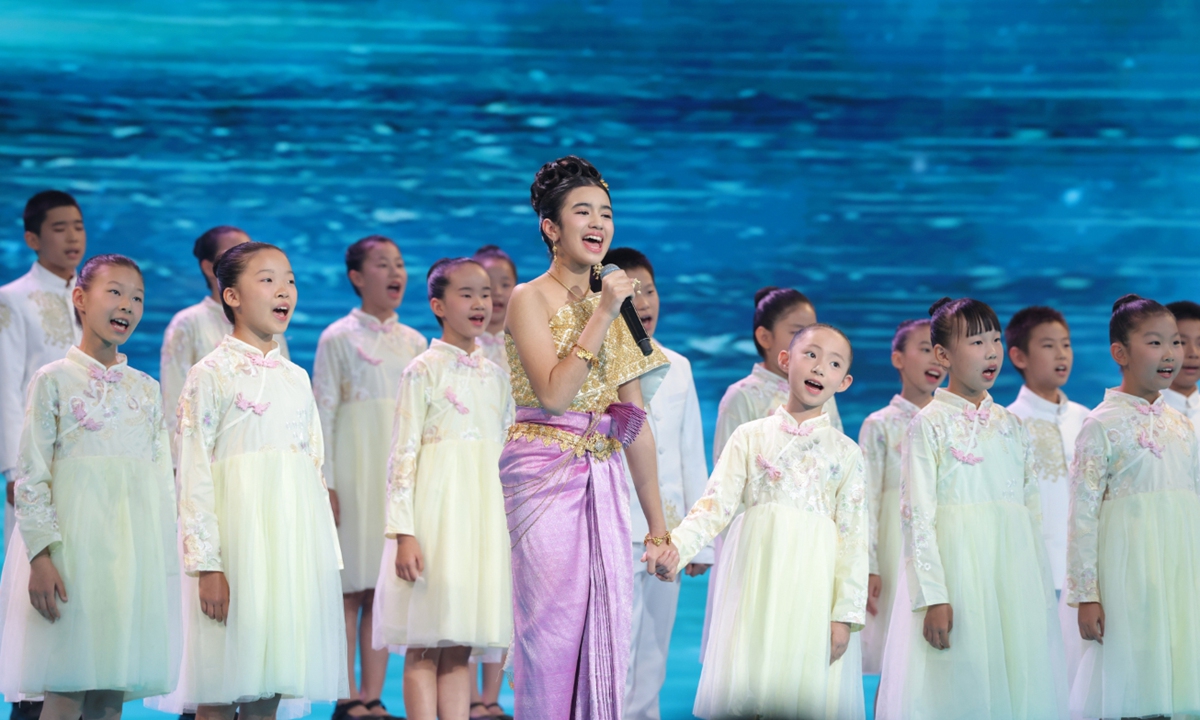ARTS / CULTURE & LEISURE
11-year-old Cambodian princess immersed in Chinese culture, celebrates long-held friendship
Carrying forward close bonds

Princess Jenna Norodom of Cambodia performs with a Chinese children's choir at The Beauty of Shared Arts program. Photo: Courtesy of The Beauty of Shared Arts
Adorned in a traditional Cambodian dress, 11-year-old Princess Jenna Norodom has captivated Chinese audiences with her performance of Cambodian and Chinese songs, as well as local dances, on the stage of Chinese state broadcaster CCTV's international cultural exchange program The Beauty of Shared Arts.This year marks the 65th anniversary of the establishment of diplomatic relations between China and Cambodia, as well as the China-Cambodia Friendship Year. The princess has conveyed the deepening friendship between China and Cambodia through her mesmerizing performances.
"Wearing the traditional dress and singing songs is my way to signify the bond between China and Cambodia, as well as my own appreciation for the friendship between the two nations," Princess Norodom told the Global Times.
Princess Norodom has long been recognized for her talents despite her young age, including singing and dancing. During her recent visits to China, her versatile showcase of talents, along with her passion for Chinese culture, has captured the hearts of many Chinese.
"For me, I wanted more people to love Cambodia and the more I started to learn about China, the more I fell in love with the country, the people, and the culture," she said.
This year marks the 10th anniversary of the China-proposed Belt and Road Initiative (BRI). The program The Beauty of Shared Arts, themed around the "Cultural Silk Road," has invited beneficiaries, participants, builders and communicators of the BRI to comprehensively narrate stories about mutual cultural learning and diverse cultural exchanges under the initiative. Princess Norodom has been one of the guests to share their stories in the program.
Her performance commenced with the Cambodian song "Angkor Path," a lyrical appreciation of the magnificent Angkor Wat temple, a UNESCO World Heritage site in the country and a symbol of the enduring friendship between China and Cambodia.
Since the last century, China has dispatched numerous experts to aid in the restoration of Cambodia's iconic temples, including the Ta Keo and Chau Say Tevoda.
Heartwarming experience
"'Angkor Path' is dedicated to our beautiful temple that is one of the wonders of the world. China has made a lot of efforts to send specialists and help Cambodia restore many parts of the temples. We are very grateful for that," expressed Princess Norodom.
The princess has also showcased her fluency in Chinese through the performance of the Chinese song "Co-nourished by the Lancang-Mekong River," accompanied by a Chinese children's choir.
"It was amazing to see their dedication. I hope to get to perform with them again in the future and maybe even in Cambodia," she said, recalling the memorable experience with the choir and calling it a "heartwarming" and "wonderful" experience that she will always cherish.
In addition to songs, the princess, who has been learning Khmer classical dance since an early age, taught a few movements of the fairy dance, one of Cambodia's intangible cultural heritages.
During the interview, she showcased several classic dance steps, which showed the process of a flower from planting to withering, and finally rebirth. The princess expressed her wish for more people to appreciate and experience the beauty of Cambodian dance.
'Nostalgia of China'
The young princess also performed "Nostalgia of China," a song composed by her great grandfather the late King Norodom Sihanouk about his affection for China.
"Singing this song was a way for me to honor his legacy and convey the emotions he felt," she noted. "I believe that the relationship between Cambodia and China has always been strong. The stories are carved on our temple walls. I'm just happy to be a part of it, and it will continue to grow with or without me."
In July 1958, then Chinese premier Zhou Enlai visited Cambodia and signed the China-Cambodia Joint Communiqué with King Norodom Sihanouk, which formally established diplomatic relations between the two countries.
Over the past decades, the bilateral relationship has remained strong, further fortified by the BRI. Cambodia was once an important site along the ancient Maritime Silk Road and is also a significant participating country in the BRI. BRI's landmark projects, including the Sihanoukville Special Economy Zone, have attracted over 170 companies, creating tens of thousands of jobs and becoming a significant manufacturing base for Cambodia.
In addition, the Phnom Penh-Sihanoukville Expressway, the Siem Reap Angkor International Airport, and hydropower plants have greatly contributed to the boosting of the country's economy, trade, investment, and tourism.
"It [the BRI] is great to have as an exchange of culture, and has had many impacts on Cambodian people's lives. Now everyone in Cambodia is starting to learn the Chinese language. This wouldn't happen if there were no positive impact on us," the princess noted.
King Norodom Sihanouk lived in China for nearly 40 years before passing away in Beijing in 2012. Reflecting on her recent visits to China, Princess Norodom said, "I can really feel the warmth and kindness of the country. It really humbled me, and I understood more why he loved this wonderful country so much."
She also expressed her own immersion in Chinese culture, learning Chinese, watching Chinese dramas and movies, listening to Chinese music. "Especially I have some idols I really love in China like Zhao Lusi. One of my favorite dramas is Hidden Love. I hope I get to meet her in the future."
The princess said that the recent trips to China have energized her to learn the language more.



